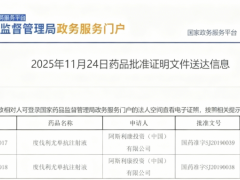2015年1月13日环宇达康医疗讯制药巨头施贵宝公司在2015年可谓是迎来一个开门红。公司开发的抗癌免疫疗法药物nivolumab在上个月获批以Opdivo的商品名上市。2015年的第一个月Opdivo又传来佳音,在施贵宝公司进行的一项肺癌对比临床研究中,Opdivo又斩获新的积极研究数据。在这项有272名肺癌患者参与的临床研究中,研究人员将Opdivo的疗效与目前临床上的标准疗法多西紫杉醇进行对比研究,结果证明了这种药物在患者总体存活率上的明显优势,达到了此前研究人员预期的首要实验终点。
Opdivo是时下研究最为火爆的PD-1药物,PD-1是一种细胞周期检验点蛋白,它的失控导致肿瘤细胞能够逃避体内免疫监控。根据FDA上月作出的决定,Opdivo被批准用于治疗黑色素瘤(相关阅读:FDA提前三个月批准施贵宝PD-1抑制剂Nivolumab(Opdivo),与Keytruda同价)。而在这一领域中类似的药物还有默沙东的Keytruda。此次施贵宝的临床研究结果使得Opdivo成为第一个对肺癌有疗效的PD-1药物。更重要的是,这一结果将帮助施贵宝公司在PD-1药物研究领域中领先起竞争对手一步。目前活跃在这一领域的医药公司包括了默沙东、罗氏和阿斯利康等生物医药巨头。
施贵宝公司透露,公司已经向FDA和欧盟医药管理部门提交了Opdivo治疗肺癌适应症的申请。当然,雄心勃勃的施贵宝公司自然不会仅仅满足于肺癌、黑色素瘤两种疾病。事实上,施贵宝公司目前正在进行超过35项Opdivo单独或联合其他药物治疗不同肿瘤类型的研究。根据分析人士预计,Opdivo未来的销售额最高将达到50亿美元之多。
最近几年兴起的癌症免疫疗法研究为人类征服癌症这一疾病带来了新的希望,几乎所有的生物医药巨头都纷纷在这一领域运筹帷幄,希望能够分享一块蛋糕。但是,究竟谁能成为这场技术革命中的最大赢家,目前尚未可知。
详细英文报道:
Bristol-Myers Squibb's ($BMY) standout immuno-oncology drug nivolumab, approved last month as Opdivo, scored a resounding success in a late-stage lung cancer trial, bolstering sales expectations for the pioneering treatment.
In a 272-patient study pitting Opdivo against the standard cancer-killer docetaxel, Bristol-Myers drug demonstrated such superior overall survival compared with the control arm that it hit its primary endpoint ahead of schedule, leading the trial's data monitoring committee recommend the study be terminated early. Bristol-Myers is now inviting the patients in the docetaxel group to opt into Opdivo through an open-label extension study.
Bristol-Myers' treatment is designed to galvanize an immune system attack on tumors by blocking a pathway called PD-1, which, left unchecked, allows cancer cells to pass undetected by the body's natural defenses. Like Merck's ($MRK) similar Keytruda, Opdivo won FDA approval last year as a treatment for melanoma, but Bristol-Myers' drug stands alone in lung cancer, as its latest clinical success marks the first time a PD-1 inhibitor has charted a survival advantage against the disease, the company said.
Opdivo's particular promise in non-small cell lung cancer has led analysts to pencil it in as the most commercially promising among therapies that block PD-1 and the related PD-L1, putting Bristol-Myers ahead of Merck, Roche ($RHHBY), AstraZeneca ($AZN) and others. Analysts figure Opdivo will bring in peak sales of around $5 billion, and Leerink's Seamus Fernandez believes the treatment's potential in lung cancer will take it as high as $7.3 billion by 2020. The entire class of therapies is expected to bring in about $35 billion a year.
Bristol-Myers has submitted lung cancer applications in the U.S. and Europe for Opdivo in lung cancer, expecting to widen the drug's use later this year.
Like its competitors, Bristol-Myers has mounted an expansive R&D program for its PD-1 candidate, running more than 35 trials in total that test Opdivo alone or as part of a cocktail in renal cell carcinoma, head and neck cancer, glioblastoma, non-Hodgkin lymphoma and other cancers.





































